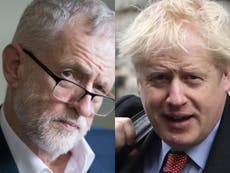Boris Johnson’s only way out of this crisis is to resign
The prime minister is trapped: he can’t have an early election; he won’t ask for a Brexit extension. There's just one way out

Jo Johnson’s resignation may not have much practical effect, but it is symbolic, and it dramatises his brother’s problem.
The prime minister cannot have an early election, because Labour MPs refuse to vote for it. He won’t ask for a Brexit extension, as required to do by the backbench bill that will be law by Monday. It looks as if he will have to resign.
Boris Johnson could even announce his intention to resign – as prime minister but not as leader of the Conservative Party – on Monday. He would have to do it anyway by 19 October, which is the date set in Hilary Benn’s bill by which whoever is prime minister would have to sign a letter to Donald Tusk, the EU president, asking for an extension to the Article 50 period.
But what is the point of waiting? Once Benn’s bill becomes law on Monday, the prime minister is trapped. As he said in the Commons yesterday, “It is a bill that effectively ends the negotiations.” There is not much more for him to talk about with the EU, because the other EU leaders know that we won’t be leaving without a deal on 31 October.
Johnson could spend the next five weeks just being prime minister, without parliament to bother him, but on borrowed time. He could attend the EU summit on 17-18 October, but with nothing substantive to say.
Whenever he chooses to announce his resignation, his only alternative would seem to be to eat not just his words but his pride and any semblance of credibility with Leave voters.
He could, I suppose, ask for a Brexit extension and say he wants another referendum, which could take six months and leave him a broken leader in the meantime. But I would have thought he’d rather say that he wants an election; that parliament has blocked him; that he will leave it to others to sort out the constitutional deadlock; and that he will fight the election when it comes.
To many people, he will have failed, because Brexit will have been delayed again – but at least not by him. He could say that he tried, but the people were betrayed by a Remainer parliament that never accepted the result of the 2016 referendum. The Brexit Party would be stronger than it would have been in a 15 October election, because Nigel Farage will accuse Johnson of breaking his promise to get us out “come what may” on 31 October. But Johnson would still have a chance of fighting a “people versus parliament” election against a divided Labour Party.
No one knows what would happen if Johnson announced his resignation. He would, presumably, refuse to advise the Queen as to whom she should invite to form a government instead. We would be in the unlikely territory of the House of Commons having to try to unite behind someone as temporary prime minister.
This caretaker figure would be charged with writing the “Dear Donald” letter that Johnson refuses to write, and then presiding over an election – after 31 October.
But who could it be? Jo Swinson, leader of the Liberal Democrats (now 16 strong), doesn’t want Jeremy Corbyn; and it’s hard to see Corbyn acquiescing to Kenneth Clarke, now an independent Conservative. I have argued before that Clarke has more implied support in the Commons than Corbyn has.
Unlikely as it may seem, Clarke could be a short-term prime minister rather soon, before a general election in November or December.



Join our commenting forum
Join thought-provoking conversations, follow other Independent readers and see their replies